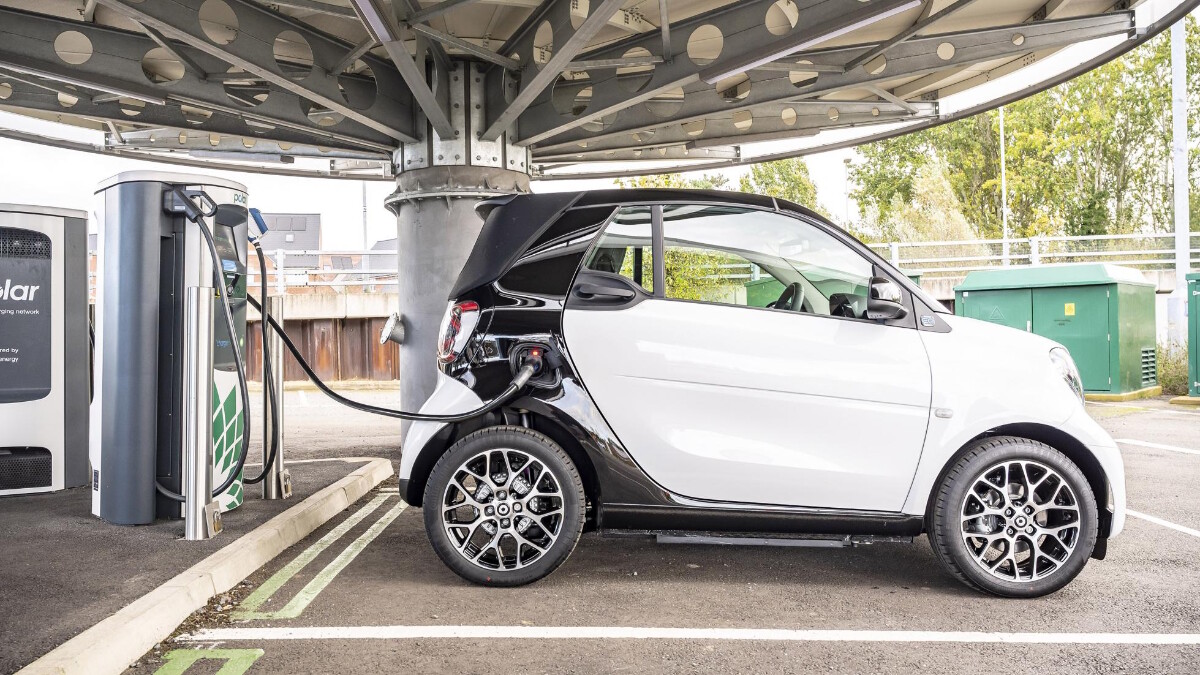
Smart cars, also known as connected cars or intelligent vehicles, are revolutionizing the automotive industry. These technologically advanced vehicles are equipped with a range of features that enhance safety, convenience, and efficiency. From autonomous driving capabilities to integrated connectivity and advanced telematics, smart cars are reshaping the way we think about transportation. In this article, we will delve into 18 fascinating facts about smart cars, shedding light on their evolution, impact on the environment, and the innovative technologies that drive them. Whether you're a tech enthusiast, a car aficionado, or simply curious about the future of transportation, these insights will provide a comprehensive understanding of the smart car landscape. So, fasten your seatbelt and get ready to explore the exciting world of smart cars!
Key Takeaways:
- Smart cars prioritize safety, efficiency, and connectivity, making them ideal for urban living. Their compact size, electric power, and innovative design offer a sustainable and personalized driving experience.
- Smart cars inspire sustainable mindsets and technological advancements, shaping the future of transportation. They foster community connectivity and promote eco-friendly urban planning, leading the way towards a greener and more connected automotive landscape.
Smart Cars Are Efficient
Smart cars are designed to be highly efficient, utilizing cutting-edge technology to maximize fuel economy and reduce emissions. These vehicles are engineered with lightweight materials and aerodynamic designs to minimize drag and enhance overall efficiency.
Smart cars are also equipped with advanced engine management systems that optimize fuel combustion, resulting in impressive mileage and reduced environmental impact. This focus on efficiency aligns with the growing demand for eco-friendly transportation solutions, making smart cars an attractive option for environmentally conscious consumers.
Smart Cars Prioritize Safety
Safety is a paramount consideration in the design and engineering of smart cars. These vehicles incorporate a range of innovative safety features, including advanced airbag systems, electronic stability control, and collision avoidance technology. Additionally, smart cars often utilize high-strength materials in their construction to enhance occupant protection in the event of a collision.
The implementation of cutting-edge safety measures underscores the commitment to safeguarding drivers, passengers, and pedestrians alike. As a result, smart cars have earned recognition for their dedication to prioritizing safety without compromising on performance or style.
Smart Cars Embrace Connectivity
In the digital age, connectivity is a key aspect of modern vehicles, and smart cars excel in this domain. These vehicles are equipped with sophisticated infotainment systems, seamless smartphone integration, and advanced telematics capabilities. This integration facilitates effortless communication, navigation, and entertainment, enhancing the overall driving experience.
Smart cars also leverage connectivity for remote diagnostics and over-the-air updates, ensuring that the vehicle remains technologically current and optimized for peak performance. This emphasis on connectivity reflects the evolving landscape of automotive technology, catering to the preferences of tech-savvy consumers.
Smart Cars Champion Urban Mobility
With the increasing urbanization of global populations, smart cars have emerged as a vital component of urban mobility solutions. Their compact dimensions and agile maneuverability make them well-suited for navigating congested city streets and limited parking spaces. Moreover, smart cars are often electric or hybrid, offering a sustainable mode of transportation within urban environments.
By championing urban mobility, smart cars contribute to alleviating traffic congestion and reducing emissions in densely populated areas. This emphasis on urban-friendly transportation aligns with the evolving needs of city dwellers, positioning smart cars as a practical and eco-conscious choice for urban mobility.
Smart Cars Boast Innovative Design
The design of smart cars is characterized by innovation, blending futuristic aesthetics with functional practicality. These vehicles feature sleek, aerodynamic profiles that not only enhance efficiency but also exude a sense of modernity and sophistication. The interior spaces are thoughtfully crafted to maximize comfort and utility within a compact footprint.
Furthermore, smart cars often incorporate customizable elements and vibrant color options, allowing drivers to express their individuality through personalized design choices. This focus on innovative design sets smart cars apart, appealing to those who seek a harmonious fusion of style and substance in their automotive preferences.
Smart Cars Offer Nimble Performance
Despite their compact size, smart cars deliver nimble performance that is well-suited for urban driving conditions. The responsive handling and agile maneuverability of these vehicles make them adept at navigating tight city streets and executing seamless parking maneuvers. This agility is complemented by efficient powertrains that deliver zippy acceleration and responsive throttle control.
Smart cars' nimble performance contributes to a dynamic and engaging driving experience, making urban commutes and city driving more enjoyable and stress-free. The fusion of efficiency and agility positions smart cars as a compelling choice for urban-centric lifestyles.
Smart Cars Embrace Electric Power
Electric power has become synonymous with smart cars, as many models are offered with fully electric or hybrid powertrains. This embrace of electric mobility aligns with the global shift towards sustainable energy sources and reduced reliance on fossil fuels. Smart cars leverage electric power to deliver zero-emission driving without compromising on range or performance.
Furthermore, the integration of electric power in smart cars reflects a commitment to environmental stewardship and a forward-looking approach to automotive technology. By embracing electric power, smart cars contribute to the ongoing transition towards a greener and more sustainable transportation ecosystem.
Smart Cars Prioritize Convenience
Convenience is a hallmark of smart cars, as these vehicles are designed to streamline the driving experience and simplify everyday tasks. From compact dimensions that facilitate effortless parking to intuitive infotainment systems that enhance connectivity, smart cars prioritize convenience in various aspects of their design and functionality.
Additionally, smart cars often feature advanced driver-assist technologies that aid in parking, maneuvering, and navigating urban environments with ease. This emphasis on convenience aligns with the evolving expectations of modern drivers, who seek seamless integration of technology and practicality in their vehicles.
Smart Cars Embody Environmental Responsibility
Environmental responsibility is ingrained in the DNA of smart cars, as these vehicles are engineered to minimize their carbon footprint and reduce environmental impact. By leveraging advanced engineering techniques and eco-friendly materials, smart cars strive to uphold sustainability principles without compromising on performance or comfort.
Furthermore, the adoption of electric power and efficient propulsion systems underscores the commitment to environmental responsibility, offering a viable alternative to traditional internal combustion vehicles. Smart cars embody a conscientious approach to mobility, resonating with individuals who prioritize environmental stewardship in their transportation choices.
Smart Cars Showcase Technological Innovation
Technological innovation is a defining trait of smart cars, as these vehicles integrate a myriad of advanced features and cutting-edge systems. From autonomous driving capabilities to intelligent connectivity solutions, smart cars are at the forefront of automotive innovation, shaping the future of mobility.
The incorporation of state-of-the-art sensors, adaptive control systems, and predictive analytics underscores the technological prowess of smart cars, paving the way for enhanced safety, efficiency, and user experience. This emphasis on technological innovation positions smart cars as pioneers in the evolution of automotive technology, driving the industry towards new frontiers of possibility.
Smart Cars Cultivate Personalization
Personalization is a key aspect of the smart car experience, allowing drivers to tailor their vehicles to reflect their unique preferences and lifestyles. Whether through customizable exterior color options, interior design elements, or advanced infotainment settings, smart cars offer a range of personalization choices to enhance the ownership experience.
This emphasis on personalization fosters a sense of individuality and ownership pride, empowering drivers to create a vehicle that resonates with their personal style and identity. Smart cars cultivate a personalized approach to automotive ownership, catering to the diverse tastes and preferences of modern consumers.
Smart Cars Embrace Autonomous Capabilities
The evolution of smart cars encompasses the integration of autonomous capabilities, marking a significant leap towards the future of mobility. These vehicles are equipped with advanced driver-assist systems and autonomous driving features that enhance safety, convenience, and overall driving experience.
The embrace of autonomous capabilities in smart cars reflects the ongoing transformation of transportation towards a more automated and interconnected ecosystem. By leveraging autonomous technologies, smart cars are at the forefront of reshaping the way individuals interact with and perceive vehicular mobility.
Smart Cars Promote Sustainable Living
Smart cars play a pivotal role in promoting sustainable living by offering eco-friendly transportation solutions that align with the principles of environmental conservation and resource efficiency. The integration of electric power, efficient propulsion systems, and sustainable materials underscores the commitment to fostering a more sustainable way of life.
Furthermore, smart cars contribute to reducing air pollution and carbon emissions, making a positive impact on the environment and public health. Through their dedication to sustainable living, smart cars advocate for a greener and more harmonious coexistence with the planet.
Smart Cars Foster Community Connectivity
Beyond individual transportation, smart cars foster community connectivity by facilitating shared mobility and collaborative urban transportation solutions. Car-sharing initiatives and ride-hailing services leverage smart cars to provide convenient and sustainable mobility options for communities, reducing the reliance on individual vehicle ownership.
This emphasis on community connectivity aligns with the evolving paradigm of shared mobility and collaborative urban transportation, promoting efficient resource utilization and reducing traffic congestion. Smart cars serve as enablers of community-driven mobility solutions, fostering interconnectedness and sustainable transportation practices.
Smart Cars Inspire Innovation in Urban Planning
The presence of smart cars in urban environments inspires innovation in urban planning and infrastructure development. Their compact footprint and eco-friendly attributes influence urban design strategies, encouraging the creation of pedestrian-friendly spaces, dedicated cycling lanes, and efficient public transportation networks.
By inspiring innovation in urban planning, smart cars contribute to the evolution of sustainable and livable cities, shaping urban landscapes that prioritize human-centric mobility and environmental harmony. This influence on urban planning underscores the transformative potential of smart cars in reimagining urban spaces for the better.
Smart Cars Embrace Versatile Utility
Despite their compact size, smart cars embrace versatile utility, offering practical solutions for diverse transportation needs. From daily commutes to urban errands, smart cars excel in providing agile and efficient mobility for various scenarios, adapting seamlessly to the demands of modern lifestyles.
Moreover, the versatility of smart cars extends to their adaptability in urban environments, where limited parking spaces and congested streets necessitate nimble and practical transportation solutions. This versatile utility positions smart cars as versatile companions for urban dwellers seeking flexible and reliable mobility options.
Smart Cars Cultivate Sustainable Mindsets
The presence of smart cars in the automotive landscape cultivates sustainable mindsets among consumers, encouraging a shift towards eco-conscious transportation choices and lifestyle practices. By exemplifying the benefits of electric mobility and environmental responsibility, smart cars inspire individuals to embrace sustainability in their daily lives.
This cultivation of sustainable mindsets extends beyond the realm of transportation, influencing consumer behaviors and choices in favor of eco-friendly and energy-efficient options. Smart cars serve as catalysts for promoting sustainable mindsets and fostering a collective commitment to environmental conservation.
Smart Cars Propel Technological Advancements
Smart cars propel technological advancements within the automotive industry, driving innovation and progress across various domains of vehicular technology. From electric powertrains to autonomous driving systems, smart cars serve as catalysts for pushing the boundaries of what is possible in automotive engineering and design.
The pursuit of technological advancements in smart cars contributes to the evolution of mobility, safety, and sustainability, shaping the future of transportation on a global scale. By propelling technological advancements, smart cars lead the charge towards a more connected, efficient, and technologically advanced automotive landscape.
Smart cars represent a paradigm shift in the automotive industry, embodying a fusion of technological innovation, environmental responsibility, and urban-centric design. As the demand for sustainable and connected mobility solutions continues to rise, smart cars stand at the forefront of reshaping the way individuals interact with and perceive vehicular transportation. With their emphasis on efficiency, safety, and connectivity, smart cars pave the way for a future where urban mobility is synonymous with sustainability, innovation, and personalized experiences. The "18 Facts About Smart Cars" encapsulate the multifaceted appeal and transformative potential of these vehicles, heralding a new era of smart and sustainable transportation.
Conclusion
In conclusion, smart cars represent a revolutionary leap in automotive technology, offering a myriad of benefits ranging from enhanced safety features to improved fuel efficiency. These vehicles are equipped with advanced systems that enable autonomous driving, making transportation more convenient and environmentally friendly. As the automotive industry continues to evolve, smart cars are poised to play a pivotal role in shaping the future of transportation. Embracing the concepts of connectivity, automation, and electrification, smart cars are driving us towards a more sustainable and efficient future on the roads.
FAQs
What makes smart cars different from traditional vehicles?Smart cars are equipped with advanced technologies such as sensors, cameras, and artificial intelligence that enable them to perceive their surroundings and make autonomous driving decisions. This sets them apart from traditional vehicles, which rely solely on manual control by the driver.
Are smart cars safe to use?Smart cars are designed with safety as a top priority, incorporating features such as collision avoidance systems, adaptive cruise control, and automatic emergency braking. These technologies work together to enhance the overall safety of smart cars, making them a reliable and secure mode of transportation.
Was this page helpful?
Our commitment to delivering trustworthy and engaging content is at the heart of what we do. Each fact on our site is contributed by real users like you, bringing a wealth of diverse insights and information. To ensure the highest standards of accuracy and reliability, our dedicated editors meticulously review each submission. This process guarantees that the facts we share are not only fascinating but also credible. Trust in our commitment to quality and authenticity as you explore and learn with us.


